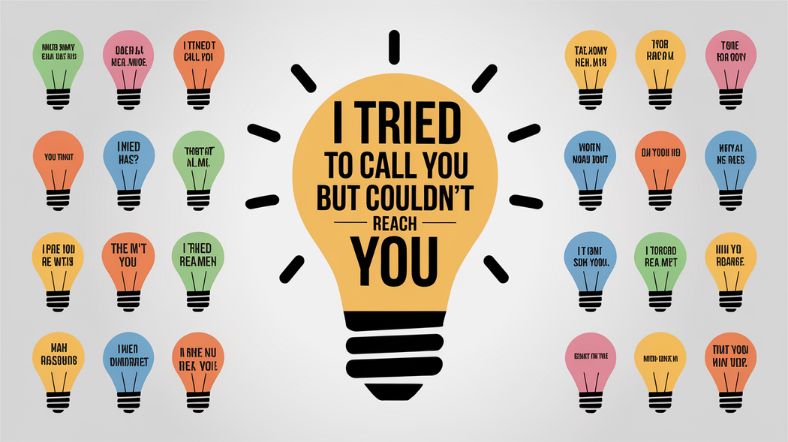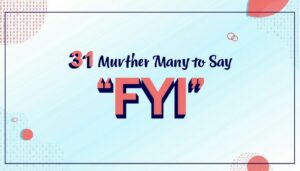Effective communication is the cornerstone of building strong relationships, whether in professional or personal settings.
While reaching out to someone via phone is often the quickest and most direct method, sometimes we may encounter busy signals, voicemails, or other interruptions that prevent us from connecting.
In these situations, the way we express that we attempted to reach someone can influence how the message is received.
This article explores 15 alternative ways to say, “I tried to call you but couldn’t reach you,” offering various tones, contexts, and nuances to suit different interactions.
Whether you’re crafting an email to a colleague, sending a casual text to a friend, or even leaving a voicemail, you’ll find the right phrase to maintain clarity and positivity.
“I attempted to contact you earlier, but was unable to connect.”
This phrase is formal and professional, ideal for business emails or official communication. It implies you made an effort but did not reach success.
Example:
“I attempted to contact you earlier regarding the meeting agenda but was unable to connect. Could we arrange a time to discuss?”
Impact: It shows respect for the other person’s time while communicating your intent to follow up.
“I couldn’t get through to you when I called.”
This is a straightforward and casual way to express that you were unsuccessful in reaching someone. It works well for text messages or informal emails.
Example:
“I couldn’t get through to you when I called—just wanted to check if you received the update.”
Impact: Friendly and non-judgmental, this approach keeps the tone light while conveying your message clearly.
“I tried to call you but couldn’t reach you formal”
“I attempted to call but was unable to reach you.”
This phrase is concise and professional, ideal for formal emails or messages.
Example: “I attempted to call but was unable to reach you; please let me know when you’re available.”
Impact: It communicates your effort while remaining neutral and respectful.
“I called earlier but could not get through.”
This is a polite way to indicate a missed connection without assigning blame.
Example: “I called earlier but could not get through; I would appreciate it if you could suggest a better time.”
Impact: It shows understanding and sets the stage for rescheduling.
“I tried reaching you by phone but had no success.”
This formal approach emphasizes your attempt without sounding overly informal.
Example: “I tried reaching you by phone but had no success; kindly let me know when we can connect.”
Impact: It conveys professionalism and a willingness to connect at a more convenient time.
“I tried calling but it seems I missed you.”
This phrase is friendly and positive, often used in situations where you don’t want to create any pressure. It’s useful when calling a friend or colleague.
Example:
“I tried calling but it seems I missed you. Let me know when you’re available to chat.”
Impact: It creates a sense of understanding and patience, signaling that you’re okay with the missed connection.
“I wasn’t able to reach you by phone.”
This is another neutral, simple phrase that works well in professional contexts. It’s polite without being overly formal.
Example:
“I wasn’t able to reach you by phone, so I’m sending this email instead to follow up.”
Impact: It’s neutral but still communicates your need for a response, without making the other party feel rushed.
“It looks like you were unavailable when I called.”
This approach softens the message, acknowledging that the person might have been busy or tied up. It’s ideal for text or casual emails.
Example:
“It looks like you were unavailable when I called. Let me know when you have a free moment.”
Impact: This phrase is empathetic and non-intrusive, showing that you’re understanding of their situation.
“We tried to reach you over the phone but no respon”
“We tried reaching you by phone but received no response.”
This phrase is formal and straightforward, suitable for professional communication.
Example: “We tried reaching you by phone but received no response; kindly let us know when you’re available.”
Impact: It clearly communicates the missed connection while maintaining a polite tone and openness to further communication.
“Our attempt to contact you by phone went unanswered.”
This variation sounds professional and slightly more formal, perfect for official follow-ups.
Example: “Our attempt to contact you by phone went unanswered; we would appreciate it if you could suggest an alternate time.”
Impact: It respectfully highlights the lack of response while prompting the recipient to engage at their convenience.
“I was hoping to catch you, but couldn’t get through.”
A friendly and conversational phrase, it suggests you were simply trying to connect and are open to retrying.
Example:
“I was hoping to catch you, but couldn’t get through. I’ll try again later.”
Impact: It conveys optimism and flexibility, offering a positive outlook on reconnecting.
“I gave you a ring, but you were unreachable.”
A more casual and slightly informal way of expressing the missed call, this is great for friends or acquaintances.
Example:
“I gave you a ring, but you were unreachable. Let me know when’s a good time to chat!”
Impact: This phrase is upbeat, signaling that you’re not discouraged by the missed connection.
“I wasn’t able to get ahold of you earlier.”
This phrase sounds approachable and can be used in both casual and semi-formal settings. It focuses on your inability to make contact rather than pointing out the other person’s unavailability.
Example:
“I wasn’t able to get ahold of you earlier, but I wanted to follow up on our discussion.”
Impact: Neutral and polite, this communicates that you’ve made an effort while leaving room for understanding.
“Tried calling you”
“I tried calling you earlier but couldn’t get through.”
This phrase is casual yet polite, suitable for both personal and professional settings.
Example: “I tried calling you earlier but couldn’t get through; please let me know a better time to reach you.”
Impact: It conveys your effort to connect while maintaining a friendly and non-urgent tone.
“I tried calling you but was unable to reach you.”
A straightforward and professional way to indicate an unsuccessful attempt.
Example: “I tried calling you but was unable to reach you; I’ll follow up via email for the details.”
Impact: It keeps the communication formal while showing your intent to continue the conversation.
“I tried reaching you, but there was no answer.”
This is clear and concise, making it suitable for both emails and casual conversations.
Example:
“I tried reaching you, but there was no answer. Could you let me know when you’re free?”
Impact: Straightforward, it’s ideal when you want to keep things simple and to the point.
“I attempted to call but couldn’t get through.”
Similar to previous alternatives but with a slightly more formal tone. It’s appropriate for professional emails or polite follow-ups.
Example:
“I attempted to call but couldn’t get through. Please let me know if there’s a better time to reach you.”
Impact: It shows professionalism and respect for the other person’s time while indicating you’re eager to connect.
“Tried calling you but no response”
“I tried calling you but received no response.”
This phrase is clear and polite, suitable for both formal and casual settings.
Example: “I tried calling you but received no response; please let me know when you’re available.”
Impact: It politely communicates the missed connection and encourages a response at a more convenient time.
“I attempted to call but got no answer.”
This is a simple and respectful way to express an unanswered call.
Example: “I attempted to call but got no answer; I’d appreciate it if you could let me know when we can reconnect.”
Impact: It conveys professionalism and sets the stage for rescheduling without placing blame.
“I missed connecting with you on the phone earlier.”
This phrase suggests the attempt was unsuccessful, but with an optimistic tone. It works well in casual or semi-formal contexts.
Example:
“I missed connecting with you on the phone earlier, but I’m available now if you’re free.”
Impact: It’s a lighthearted approach that leaves the door open for further communication.
“I wasn’t able to get through when I dialed.”
Simple and to the point, this phrase fits well in more casual or everyday scenarios, particularly in texts or quick emails.
Example:
“I wasn’t able to get through when I dialed. Give me a shout when you’re free!”
Impact: The casual tone keeps things friendly and avoids putting pressure on the other person.
“I called but couldn’t reach you at that moment.”
This approach is slightly more formal and can be used in both personal and professional settings. It conveys a sense of timing without sounding accusatory.
Example:
“I called but couldn’t reach you at that moment. If now is a better time, feel free to return the call.”
Impact: Shows patience while still addressing the need to follow up, demonstrating professionalism.
“I tried to call you several times but unfortunately i couldn’t reach”
“I tried to call you several times, but unfortunately, I couldn’t reach you.”
This phrase is polite and expresses persistence while acknowledging the lack of success.
Example: “I tried to call you several times, but unfortunately, I couldn’t reach you. Please let me know a suitable time to connect.”
Impact: It shows that you’ve made multiple attempts, while also leaving the door open for further communication.
“I attempted to call you several times, but was unable to get through.”
This is a formal and respectful way to communicate the situation, appropriate for business contexts.
Example: “I attempted to call you several times, but was unable to get through. Kindly let me know when you’re available for a quick discussion.”
Impact: It conveys professionalism and patience, suggesting a willingness to continue the conversation at their convenience.
“I tried to give you a quick call, but you were unavailable.”
This version is conversational yet acknowledges the missed connection without assigning fault, making it ideal for friendly exchanges.
Example:
“I tried to give you a quick call, but you were unavailable. Let me know when you have time to chat.”
Impact: It creates a non-urgent, approachable atmosphere, allowing for future engagement without stress.
“I reached out but couldn’t connect with you.”
A more neutral option, this phrase works well in business contexts, emails, or even casual conversations.
Example:
“I reached out but couldn’t connect with you. I’m happy to try again later if it’s more convenient for you.”
Impact: It communicates persistence while respecting the other person’s time and space.
Conclusion
Using varied ways to express that you’ve tried to call someone can enhance your communication style, showing thoughtfulness, professionalism, or a friendly attitude.
Depending on the context whether formal or casual you can tailor your message to fit the situation.
Experiment with these alternatives to create a tone that matches the relationship you’re fostering. Whether you’re following up with a colleague, checking in with a friend, or leaving a message, these phrases help ensure your attempts to connect are understood without coming across as pushy.

Mark Tony is a grammar expert with 5 years of experience, specializing in teaching English grammar, enhancing writing, reading, and speaking skills for diverse learners.









